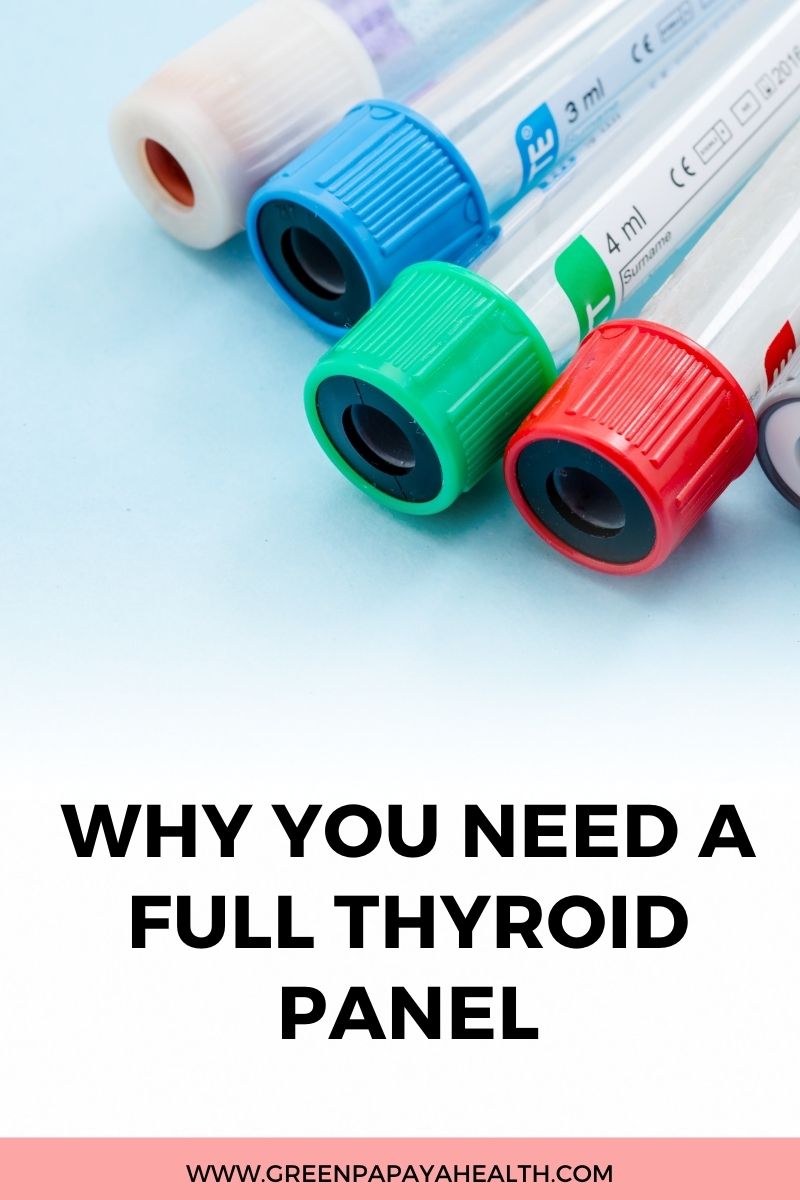Why do I need to run a full thyroid panel?
This is a question I get asked by many clients. Most people who suspect they have thyroid issues go to a conventional medicine doctor who runs a TSH test, and maybe a Total T4. Or they have a TSH in the reference range and are told that they are fine or that feeling subpar is just part of aging.
Conservative estimates are that 200+ million people worldwide suffer from a thyroid-related illness; the vast majority are women. Thyroid disease is ~10 times more common in women than in men and over half of the cases are undiagnosed, with many more being undertreated. That’s why it’s important to dig deeper with your thyroid lab work. We want to be detectives and know the why.
Every cell in the body relies on the thyroid hormone for the regulation of its metabolism. After all, if there’s not a lot of gas in the car, it won’t go far! Because of its effect on all other body systems, thyroid disorder can be a key driver or root cause of many other states of disease and dysfunction in the body.
How do you know if you have thyroid issues? Symptoms+lab tests. Because the symptoms of thyroid issues can mimic other hormone imbalances, it’s important to get your thyroid tested. If you have multiple symptoms of a thyroid disorder, family history, or trouble conceiving I recommend you get a full thyroid panel done. In fact, I think every woman should have a full thyroid panel run at their yearly checkup.
Symptoms of Hypothyroidism
- Things are running too slowly
- Unexplained weight gain or hard to lose weight
- Fatigue
- Increased LDL Cholesterol
- Sensitivity to cold
- Dry skin
- Hair loss
- Anxiety, depression, panic
- Digestive issues
- Joint pain, muscle aches
- Constipation
- Heavy or irregular periods
- Thinning eyebrows (especially the outer third)
- Infertility
- Rough PM or menopause symptoms
If you have two or more of the above symptoms I recommend getting a full thyroid panel.
What is a Full Thyroid Panel?
TSH – Thyroid Stimulating Hormone. This is the test most often run in conventional medicine. And while it’s helpful, it doesn’t give us the bigger picture. TSH is not a thyroid hormone, it’s actually made in the pituitary gland in your brain. TSH alone is a poor marker for true thyroid hormone sufficiency.
Free T4 – T4 or Thyroxine Is produced by the thyroid gland. Most T4 needs to be converted to the active form, T3. Free means it is unbound and available for use in the body. Both Free T4 and Free T3 need to be measured to best assess overall thyroid function.
Free T3 – T3 or triiodothyronine is often left out of thyroid testing altogether, but it’s very important and is responsible for so much. It’s important to test Free T3 because being free means it’s unbound and can have cellular effects. T4 is converted to T3 in the liver, kidneys, and gut. Low T3 is often not treated, but many people have issues converting T4 to T3, so no amount of T4 (Levothyroxine, etc) is going to make you feel better if you have a problem with this conversion. If you’re continuing to have hypothyroid symptoms Free T3 levels can give us some big clues as to why.
Reverse T3 – Reverse T3 is the opposite of Free T3 and can be helpful to look at if Free T3 continues to be low even after you’ve done some work with it. Reverse T3 blocks hormone receptors which inhibit Free T3 from being able to act at the cellular level. Cortisol, your stress hormone, increases the production of Reverse T3.
TPO & Tg Antibodies – Autoimmune dynamics are missed in many people because antibody tests aren’t run. Upwards of 90% of hypothyroidism has an autoimmune component, so it’s important to have your antibodies checked. Antibodies are proteins made by the immune system when they think a foreign invader is present. Many doctors won’t check antibodies, but they are important because they can show the presence of an autoimmune dynamic in the body.
I hope this has helped you understand why getting a full thyroid panel can be helpful in figuring out the why in your thyroid health. Thyroid health is complex and it’s important to look at all the components that can be impacting your thyroid. You deserve to feel good and to understand the why. Living with the symptoms of hypothyroidism doesn’t have to be part of your long-term story. A full thyroid panel should be the basic standard of care when it comes to thyroid health. As always, I recommend talking to your doctor and if they are unwilling to work with you, it’s ok to find a practitioner who will.
I love hearing from readers and hope you found this blog helpful. Please let me know in the comments. If you think we would be a good fit for health coaching, apply here.
Be sure to share this post with any woman you think might benefit from it and share it on social media.







Pingback: Six Ways to Protect Your Thyroid - Green Papaya Health
Pingback: Thyroid Awareness Month: What to Know - Green Papaya Health